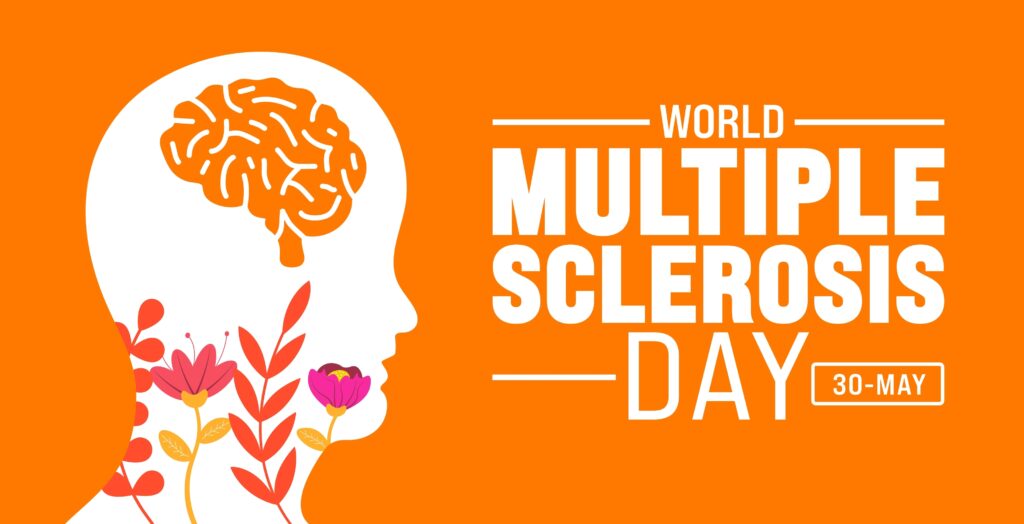Recognized on May 30 each year, World MS Day brings together global communities, healthcare professionals and life sciences industries to share stories, raise awareness and support those affected by multiple sclerosis (MS). World MS Day 2024 is led by the Multiple Sclerosis International Federation (MSIF), an organization that unites and collaborates with MS societies around the globe.
As we observe World MS Day 2024, our focus shifts towards raising awareness and fostering understanding about MS, a complex neurological condition that continues to affect millions worldwide.
About 300 people across the globe are diagnosed with MS each day, with the average age of diagnosis spanning anywhere between 20 and 40 years. Women are two to three times as likely to be diagnosed with MS as compared to men, and children account for about three to five percent of the patient population.
The Atlas of MS highlights a significant global increase in the number of people diagnosed with MS. As of 2023, approximately 2.9 million individuals worldwide are living with MS.
Understanding Multiple Sclerosis
MS is a chronic autoimmune disorder that affects the central nervous system, particularly the brain and spinal cord. It occurs when the immune system mistakenly attacks the protective sheath (myelin) that covers nerve fibers, causing communication problems between the brain and the rest of the body.
The symptoms of MS are diverse and vary widely among patients, depending on the amount of nerve damage and which nerves are affected. Those with MS might display numbness or weakness in one or more limbs, partial or complete loss of vision, tingling or pain in parts of the body, fatigue, dizziness, bladder dysfunction and more.
Diagnosing MS, therefore, becomes complex due to its varied and often subtle symptoms, which can mimic those of other neurological diseases. Symptoms like fatigue, numbness and dizziness are nonspecific and fluctuate, often leading to delays and misdiagnosis. This complexity makes early and accurate diagnosis challenging yet critical.
XTALKS WEBINAR: Pioneering New Drug Modalities: The Future of Therapeutic Leadership
Live and On-Demand: Wednesday, June 19, 2024, at 11am EDT (4pm BST/UK)
Register for this free webinar to gain insights into the impact of new drug modalities, strategic considerations for navigating the drug discovery field and the role of data-driven strategies.
New Treatments and Ongoing Clinical Trials for Multiple Sclerosis
The current breadth of MS research and clinical trials focuses on neuroprotective therapies and remyelination drugs. These seek to protect the nervous system from MS damage and slow disease progression. Remyelination drugs, in particular, can repair myelin sheaths, the nerve coverings damaged by MS.
In December 2022, the US Food and Drug Administration (FDA) approved TG Therapeutics’ Briumvi (ublituximab), a breakthrough CD20 monoclonal antibody for relapsing MS that limits the actions of immune cells causing potential nerve damage.
The first ever biosimilar Tyruko (natalizumab-sztn) was approved last year for three different types of relapsing MS — clinically isolated syndrome, relapsing-remitting disease and active secondary progressive disease.
“Biosimilar medications offer additional effective treatment options that have the potential to increase access for people living with relapsing forms of multiple sclerosis,” said Paul R. Lee, director of the Division of Neurology 2 at the FDA’s Center for Drug Evaluation and Research (CDER) in the FDA news release addressing Tyruko’s approval.
MS Canada provides detailed information on the landscape of MS treatments. Health Canada has approved 18 disease-modifying therapies (DMTs) that target various aspects of MS. DMTs are crucial in managing relapsing forms of MS — they work by reducing inflammation, frequency of relapses and slowing disease progression.
In addition to the current treatment landscape, the MS Society UK has highlighted several emerging treatments in clinical trials. Among these, Sanofi’s tolebrutinib is in Phase III for treating various forms of MS, showing promise in managing both relapsing and progressive forms.
Simvastatin, traditionally used for high cholesterol, is also undergoing Phase III trials to assess its effectiveness in MS treatment.
Another notable Phase II trial involves metformin, known for treating type 2 diabetes, which is being tested for its potential to protect nerve cells in progressive MS and to repair myelin when combined with clemastine, a hay fever drug.
World MS Day 2024 Theme: Diagnosis
World MS Day 2024 and 2025 has taken on a new direction with the theme “Diagnosis,” encapsulated in the campaign titled “My MS Diagnosis: Navigating MS Together.” This theme highlights the crucial importance of early and accurate diagnosis for everyone living with MS and brings attention to the global barriers in diagnosing MS.
The My MS Diagnosis campaign will focus on enhancing MS training and awareness among healthcare professionals, supporting new research and clinical advancements aimed at improving MS diagnosis and lobbying decision-makers to address barriers to MS diagnosis, both nationally and globally. The campaign will advocate for creating communities that robustly support those diagnosed with MS and use personal stories to raise awareness and build solidarity around the experiences of MS diagnosis.
Participating in World MS Day 2024
World MS Day events span from April to June, with the central day of observance on May 30.
Here are some impactful activities you can participate in:
- Wear Orange: Demonstrate your support by wearing orange.
- MS Heart Challenge: Share a symbol of solidarity by participating in the MS Heart Challenge. Create the MS Heart symbol at a significant location and share your photo to raise awareness.
- Light Up the World: Illuminate landmarks and buildings in your city on World MS Day as a powerful display of hope and unity.
- Advocacy for Change: Advocate for better MS diagnosis and care by engaging with leaders and decision-makers to foster changes in healthcare policy.
- Join the Conversation: Share graphics, posters and your MS story using designated hashtags to create buzz online.
- Organize Activities: From flash mobs to fundraisers, or even hosting conferences, there are many creative ways to get people talking about MS. In North America, you can also participate in events like Challenge Walk MS (US) and MS Bike (Canada).
World MS Day 2024 celebrates both awareness and the significant advancements in understanding and managing MS. This optimism grows yearly as improvements in diagnosis enable earlier treatment initiation, slowing disease progression and enhancing quality of life.
Looking ahead, advancements in genetic testing may offer more personalized treatment plans, while research into lifestyle and dietary adjustments continues to promise improvements in daily living for those with MS.












Join or login to leave a comment
JOIN LOGIN